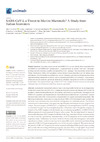Identificador persistente para citar o vincular este elemento:
https://accedacris.ulpgc.es/jspui/handle/10553/107555
| Título: | SARS-CoV-2, a threat to marine mammals? A study from Italian seawaters | Autores/as: | Audino, Tania Grattarola, Carla Centelleghe, Cinzia Peletto, Simone Giorda, Federica Florio, Caterina Lucia Caramelli, Maria Bozzetta, Elena Mazzariol, Sandro Di Guardo, Giovanni Lauriano, Giancarlo Casalone, Cristina |
Clasificación UNESCO: | 240119 Zoología marina 310907 Patología |
Palabras clave: | ACE-2 Italian Wastewater Management Species Marine Mammals SARS-CoV-2 |
Fecha de publicación: | 2021 | Publicación seriada: | Animals | Resumen: | Zoonotically transmitted coronaviruses were responsible for Severe Acute Respiratory Syndrome Coronavirus-2 (SARS-CoV-2), causing the dramatic Coronavirus Disease-2019 (CoViD-19) pandemic, which affected public health, the economy, and society on a global scale. The impact of the SARS-CoV-2 pandemic permeated into our environment and wildlife as well; in particular, concern has been raised about the viral occurrence and persistence in aquatic and marine ecosystems. The discharge of untreated wastewaters carrying infectious SARS-CoV-2 into natural water systems that are home to sea mammals may have dramatic consequences on vulnerable species. The efficient transmission of coronaviruses raises questions regarding the contributions of virus-receptor interactions. The main receptor of SARS-CoV-2 is Angiotensin Converting Enzyme-2 (ACE-2), serving as a functional receptor for the viral spike (S) protein. This study aimed, through the comparative analysis of the ACE-2 receptor with the human one, at assessing susceptibility to SARS-CoV-2 for different species of marine mammals living in Italian waters. We also determined, by means of immunohistochemistry, ACE-2 receptor localization in the lung tissue from different cetacean species, in order to provide a preliminary characterization of ACE-2 expression in the marine mammal respiratory tracts. Furthermore, to evaluate if and how Italian wastewater management and coastal exposition to extreme weather events may led to susceptible marine mammal populations being exposed to SARS-CoV-2, geomapping data were carried out and overlapped. The results showed the potential SARS-CoV-2 exposure for marine mammals inhabiting Italian coastal waters, putting them at risk when swimming and feeding in specific risk areas. Thus, we highlighted the potential hazard of the reverse zoonotic transmission of SARS-CoV-2 infection, along with its impact on marine mammals regularly inhabiting the Mediterranean Sea, while also stressing the need for appropriate action in order to prevent further damage to specific vulnerable populations. | URI: | https://accedacris.ulpgc.es/handle/10553/107555 | ISSN: | 2076-2615 | DOI: | 10.3390/ani11061663 | Fuente: | Animals [EISSN 2076-2615], v. 11 (6), 1663, (Junio 2021) |
| Colección: | Artículos |
Citas SCOPUSTM
30
actualizado el 08-jun-2025
Citas de WEB OF SCIENCETM
Citations
26
actualizado el 18-ene-2026
Visitas
100
actualizado el 11-ene-2026
Descargas
71
actualizado el 11-ene-2026
Google ScholarTM
Verifica
Altmetric
Comparte
Exporta metadatos
Los elementos en ULPGC accedaCRIS están protegidos por derechos de autor con todos los derechos reservados, a menos que se indique lo contrario.
